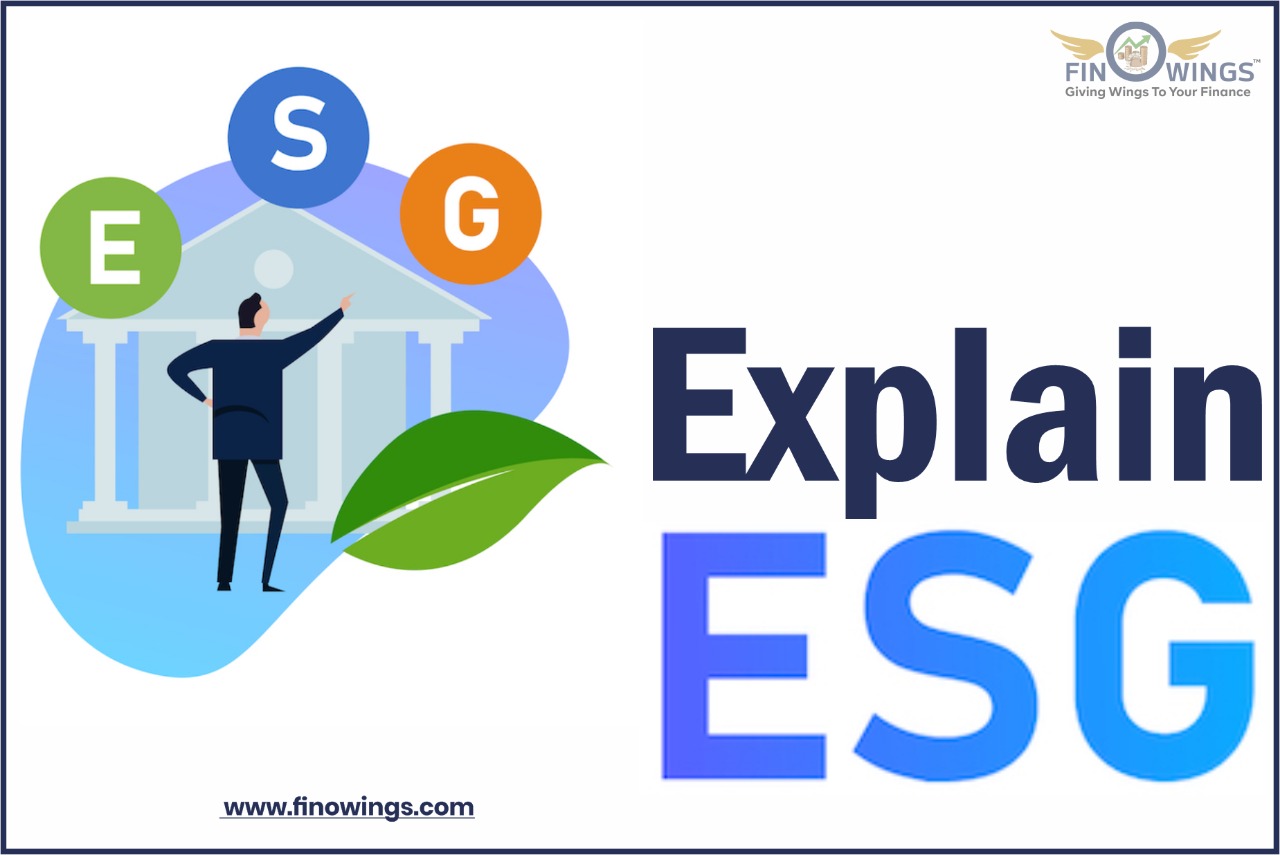Explain ESG

Table of Contents
1. What is EGS
Environmental, social, and governance, or ESG, entails the three crucial elements when assessing financial investment's sustainability and moral effect in a corporation or a business. Most socially conscious investors evaluate firms using ESG standards when considering investments.
It is a general phrase used in capital markets and frequently used by investors to assess corporate behaviour and forecast future financial results.
The environmental, social, and governance factors are a subset of non-financial performance measures that cover moral, environmentally friendly, and corporate governance concerns. These concerns involve mechanisms in place to ensure accountability and reduce the company's carbon footprint.
Since the start of this decade, there have been an increasing number of investment funds considering ESG components, and this trend is anticipated to continue over the next ten years.
2. The three main components of ESG are:
2.1 Environmental
The environmental effect(s) and risk assessment procedures of a company are called environmental standards. These include the company's resilience to physical climate threats, stewardship over environmental assets, and direct and indirect greenhouse gas emissions (including floods, fires, and climate change).
2.2 Social
The links between a corporation and its stakeholders are called the social pillar. An institution's influence on the communities in which it works and on supply chain partners, especially those in emerging economies where environmental and labour regulations may be less stringent, are further issues that a corporation may be judged against.
2.3 Governance
Governance refers to the direction and control of an organization. ESG researchers will work to understand how shareholder entitlements are perceived, how incentives for leadership are related to stakeholder demands, and what kinds of internal measures are in place to encourage leadership disclosure and accountability.
Major Points
-
Investments are screened depending on company strategies using environmental, social, and governance (ESG) criteria, which motivates businesses to behave ethically.
-
Increasingly, brokerage houses, Robo advisors, and mutual funds provide investment solutions that follow ESG principles.
-
Portfolios that use ESG investment can also assist in holding corporations that participate in risky or unethical behaviour responsible.
-
Due to the recent explosive expansion of ESG investment funds, there have been allegations that some corporations have overstated or misrepresented their ESG outcomes.
3. How does ESG investing function, and why is it important?
Consumer behaviour has evolved and has become more sustainable. Consumers strive to reduce waste, recycle, and make eco-friendly decisions. Additionally, this habit affects financial and investing choices.
Investors are, therefore, eager to utilize their funds to support businesses that uphold these principles. As investors look to fund businesses whose beliefs on environmental sustainability and social obligation line up with their own, ESG investing, also referred to as sustainable investing, has experienced exponential development.
-
ESG funds are unconventional because they prioritize the following:
-
Tracking performance to assess the viability of the firm
-
Evaluate the market's financial stability
-
Investing in businesses or sectors that adhere to specific ESG-based standards
4. Advantages and disadvantages of ESG
4.1 ESG practices have the following advantages:
Sustainable development and financial gains are compatible. According to a study published in 2021 by financial services organization Morningstar, sustainability funds can generate returns that are on par with or even higher than those of ordinary funds.
ESG can attract customers to accelerate business growth. Customers are searching for companies that provide more eco-friendly goods or services.
ESG investing supports decision-making when choosing investments. ESG groups usually emphasize moral conduct.
Businesses that are ESG-focused usually perform better on the stock market. ESG businesses frequently take more calculated risks, which lowers investor risk and gives them a more reliable long-term investment.
ESG hires and retains talented personnel. Giving employees a feeling of purpose can boost their morale and increase productivity.
ESG can lower costs. When ESG concepts are included in a company's structure, organizations can gradually reduce expenses like operating costs.
4.2 The following are the disadvantages of ESG practices:
ESG uses no one-size-fits-all strategy. A successful strategy for one business might be unsuccessful for another. It is easier to pick where to concentrate on the environmental requirements because a company should decide to integrate its approach into both its short- and long-term plans.
The ESG approach must be sincere across all platforms. Businesses that repeatedly make an effort to focus on ESG, use it as a pretence to enhance their brand image, or are disconnected from the business plan will fail.
The market won't necessarily do well. Even with successful ESG examples, a company's ability to succeed in the market cannot be assured by stressing ESG.
Putting together a diverse investment portfolio may be difficult. For those who are dedicated to an ESG-led investment strategy, a financial planner may find it more difficult to put together a balanced portfolio.
It may take some time and effort to provide comprehensive performance information for each ESG criterion point. Delivering quantified productivity outcomes requires more effort because the majority of ESG criteria aren't immediately tied to financial data.
Furthermore, there exist knowledge gaps between ESG data and the supply chain since reporting criteria and guidelines are not consistently followed.
5. Alternatives to ESG
Although ESG is the public face of sustainable investment, other choices are available to individuals considering the strategy. Even though the following terms are frequently used interchangeably, there are notable variations:
Socially responsible investing (SRI). SRI concentrates on portfolio investments that reflect an investor's environmental and social principles. Organizations that produce dangerous products or profit from unethical behaviour are excluded. SRI prioritizes the investor's principles over the rules and practices of a corporation. In contrast, ESG investing approaches strongly emphasize a firm's social and governance practices as well as its environmental performance.
Corporate social responsibility (CSR). CSR investment concentrates on a firm's overall social, environmental, operational, and economic effect on the community. CSR places a premium on doing well and spreading optimism. A business that donates a pair of shoes for every pair of shoes sold is an instance of a CSR-driven business.
Impact investment. This tactic is centred on assisting an institution in achieving particular objectives advantageous to society or the environment. For instance, a business may support renewable power research or non-profit initiatives to provide a real environmental or social good.
Conscious capitalism. Conscious capitalism, in contrast to the preceding tactics, refers to a politically and economically responsible philosophy. The foundation of conscious capitalism is that companies ought to function morally while seeking profits. The strategy strongly emphasizes the idea that a company must serve its whole environment, not simply the leadership and well-known stakeholders. The following are some further conscious capitalist philosophies:
Businesses must have a greater mission beyond profit to motivate and involve their important stakeholders.
The whole company environment must immediately focus on creating and maximizing value for all stakeholders.
Conscious leadership uses a "we" vs. "me" approach to motivating the workforce.
The values and ideals that make up a company's social and moral fibre are combined to form its conscious culture.
6. ESG & Investing
Because of how crucial the concept has become in the investment sector, ESG has genuinely become popular. As a result, an increasing number of ESG rating organizations and reporting standards have emerged to increase the uniformity and openness of the ESG data that businesses disclose to the public.
Capital markets have the potential to be an effective tool for change. For example, poor actors may be inspired to boost efficiency throughout E, S, OR G quantifies by limiting availability to capital (or unfavourable conditions). On the other hand, paying businesses and their management groups for good ESG performance has a similar beneficial effect on promoting continual development.
Green bonds, mutual funds, ETFs, and index funds are just a few of the new ESG investment instruments that have arisen (among others). Investors can more easily connect their investment choices with their personal opinions and principles regarding E, S, or G standards thanks to these publicly traded securities.
Conclusion
Organizations that adhere to sound environmental, social, and governance standards are the focus of ESG investing. ESG is an exciting sector of development that also has good consequences on society and the environment, as investors are becoming keener to match their portfolios with ESG-related businesses and fund sources. Whether you wish to align your investments with your beliefs will determine whether ESG investing is appropriate for you. You can use one or more of the numerous ESG rating systems that have emerged in recent years to design the appropriate portfolio, or you can think about an ESG-tailored mutual fund or ETF.
Author
Frequently Asked Questions
Emissions that lead to the contamination of the earth, the water, and the atmosphere. The use of resources refers to how an organization ensures that the majority of the material in its products is recycled back into the economy rather than ending up in a landfill from conception to disposal as well as whether it uses virgin or recycled materials in its manufacturing processes. In a comparable vein, businesses are encouraged to manage water supplies responsibly. The Environmental Pillar also includes issues related to land use, such as statements about biodiversity and deforestation. Firms also disclose any favourable sustainability aspects they may have, which could result in long-term commercial benefits. This pillar is the most difficult to report on.
Organizations must report on their management of employee growth and labour standards under the Social Pillar. They provide information about product liabilities relating to the reliability and calibre of their offering. They also cover their supply chain's contentious sourcing concerns, labour, and health and safety requirements. Where appropriate, businesses must provide information on how they give disadvantaged social groups access to their goods and services.
Shareholder concerns, board diversity, executive compensation, and how executive compensation relates to the sustainability effects of the organization are the primary issues covered by the Governance Pillar. It also covers business conduct issues like anti-competitive activity and corruption.














